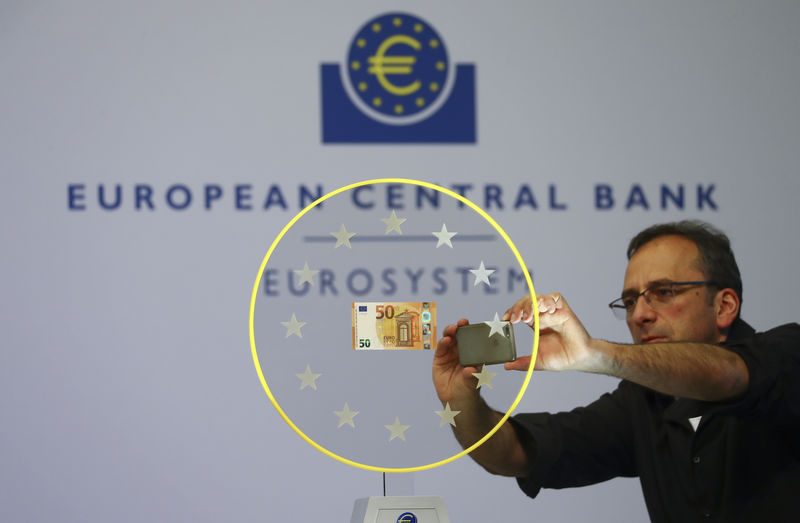This post was originally published on this site
https://i-invdn-com.akamaized.net/news/LYNXNPEF0N0WI_M.jpg
Investing.com – European stock markets are seen opening mixed Friday, with investors having to work through competing influences of a relatively optimistic ECB and fresh weakness on Wall Street.
At 2:05 AM ET (0605 GMT), the DAX futures contract in Germany traded 0.5% higher, while CAC 40 futures in France dropped 0.2% and the FTSE 100 futures contract in the U.K. fell 0.3%.
The European Central Bank left policy unchanged Thursday, as widely expected, but also marginally lifted its growth outlook for the year, buoyed by improving consumer demand.
“In the press conference, the tone was surprisingly optimistic,” said Nordea analyst Jan van Gerich in a research note. “[ECB President Christine] Lagarde emphasized the success of the pandemic emergency purchase program, and the targeted longer-term refinancing operations, the GDP forecast for this year was revised up without corresponding downward revisions to growth longer out, and the core inflation forecast for 2022 was actually revised higher.”
Possibly to counter the impression that the bank had been unduly optimistic, the ECB’s chief economist Philip Lane wrote in a blog post on Friday that: “There is no room for complacency.”
Nordea still expects the ECB to add further stimulus at the December meeting. “The economic recovery is far from guaranteed, inflation and inflation expectations will rise slowly and the ECB may need to do more to secure easy financial conditions.”
At the same time, relations between the European Union and Britain are souring, with the United Kingdom planning on drafting a law to break the divorce treaty between the two bodies, a move that would probably sink four years of Brexit talks. Data Friday showed Britain’s economy expanded by 6.6% in July from June, roughly as expected, for its third month of growth as the country recovers from its coronavirus lockdown crash.
The tone on Wall Street overnight was more subdued, as the U.S. big tech firm shares fell again on growing doubts about stretched valuations, the economic recovery and further fiscal stimulus.
Data showed there were 884,000 initial jobless claims in the U.S. last week, more than expected and casting fresh doubt on the U.S. economic recovery from the Covid-19 virus. Additionally, the U.S. Senate voted down a bill for $300 billion in stimulus measures.
In corporate news, Rio Tinto (NYSE:RIO) is likely to be in the spotlight after announcing that chief executive Jean-Sébastien Jacques, who has led the mining giant since 2016, will step down. This follows mounting shareholder criticism of the destruction of two significant Aboriginal rockshelters.
Oil prices weakened Friday, hit by a surprise rise in U.S. crude inventories which raises concerns about faltering demand from the commodity’s biggest consumer.
The U.S. Energy Information Administration reported late Thursday a build of 2 millions in crude inventories for last week against expectations of a 1.335 million-barrel draw. EIA’s figures follow the American Petroleum Institute’s report earlier in the week of a 2.970 million-barrel build.
U.S. crude futures traded 0.3% lower at $37.19 a barrel, while the international benchmark Brent contract fell 0.4% to $39.89. Both major benchmarks are down around 6.5% for the week and headed for a second week of declines.
Elsewhere, gold futures fell 0.7% to $1,950.80/oz, while EUR/USD traded 0.2% higher at 1.1837.

